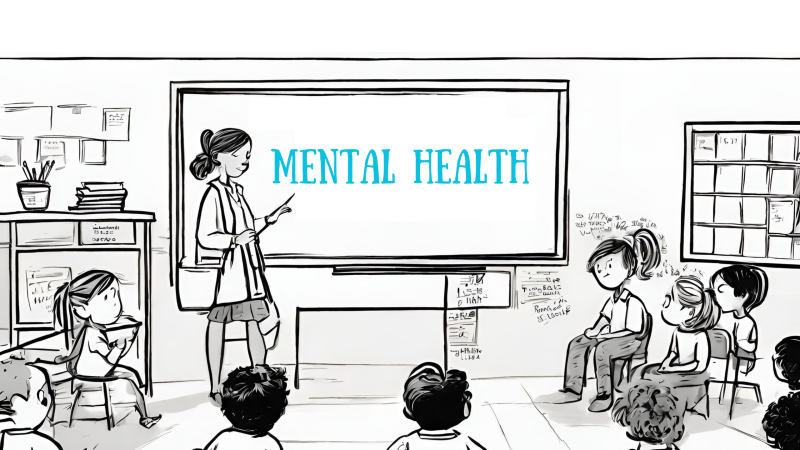One in six children aged 5-16 is likely to have a mental health problem. This figure has risen by 50 per cent in the last three years. This latest publication from Action for Children has highlighted the challenges facing children and young people, showing an increase in anxiety, depression and stress-related disorders.
As academic pressures increase and social dynamics change, concerns about children’s mental health in the school environment have become more widespread. Most importantly, what is the education sector doing to help students?

Parents have expressed concerns about this data. “The school could check in with parents more so that there’s an open conversation about mental health,” said Amanda, 57, a parent of four. “I know there is support through the PHE lessons. I’m also aware that the children’s tutors also play a role in supporting their mental health and can help with emotional difficulties, and if further help is needed, they can access help externally”.
However, the support offered by schools was also criticised.
“My friends have sometimes had less than great experiences with their children and the school is sometimes not very flexible to suit different children’s needs and situations,” said Adam Lewis, 46, who also said how schools could improve in this area “by supporting their emotional and mental health better and putting more emphasis on it in practice, not just in assemblies and saying they care, also putting more emphasis on the transition from school to adulthood”.
This criticism is not an isolated one. “Children are put on a list after an acute crisis and then left on a waiting list, with no immediate treatment or support for the child,” said Chevonne Maguire, 42, another parent.
Maguire added: “Local councils should fund appropriate, qualified, registered nurses to work in schools. Nurses should also be trained to facilitate the teaching of health education so that mental health lessons, exploring different conditions, self-management guidance and normalising rather than stigmatising normal emotional responses to social pressures are taught in schools”.
Wacker, who has worked in education for 10 years, commented on the figures cited by Action for Children. “I don’t feel that there has been a major decline in wellbeing since I started my career, but I do think that the profile of it has been raised so that it is talked about more and therefore it could be perceived as worse,” he said.
Alongside efforts in schools, the involvement of behavioural specialists has emerged as a key part of addressing children’s mental health issues.
“Children’s mental health and well-being is crucial. If they’re not happy, they’re not going to learn,” said teacher Tracy, 45, who has been a specialist in children’s social, emotional and mental health needs for 15 years. These specialists, who are brought into schools, bring expertise in identifying and managing behavioural problems and offer tailored interventions to support pupils’ emotional regulation and social skills development.

Tracy explained how the mental health system works within schools. “Once a school has identified that a child is struggling — whether it’s staff noticing or a parent or carer telling them – they should put support in place and monitor progress,” Tracy said. “They can refer to external agencies such as ed psych, autism, SEMH, play therapists, counsellors. There is also CAMHS and if things are serious, there is an emergency line.”
However, Tracy also recognises that more needs to be done to ensure that schools are doing all they can to help their pupils. “I think wellbeing needs to be at the heart of the curriculum. I think PSHE is now core in Wales. Children will pick up if adults are stressed, so I think a precursor is for schools to focus on staff wellbeing,” said Tracy.
While progress is being made in destigmatising mental health issues, it is recognised that more comprehensive and sustained efforts are needed. Advocates stress the importance of integrating mental health education into the curriculum and ensuring that support services are easily accessible to all students.
As the conversation around adolescent mental health continues to evolve, it remains a priority for educators and communities to work together to foster an environment that supports not only academic success, but also the emotional well-being of every student.
Find out more about mental health services.








